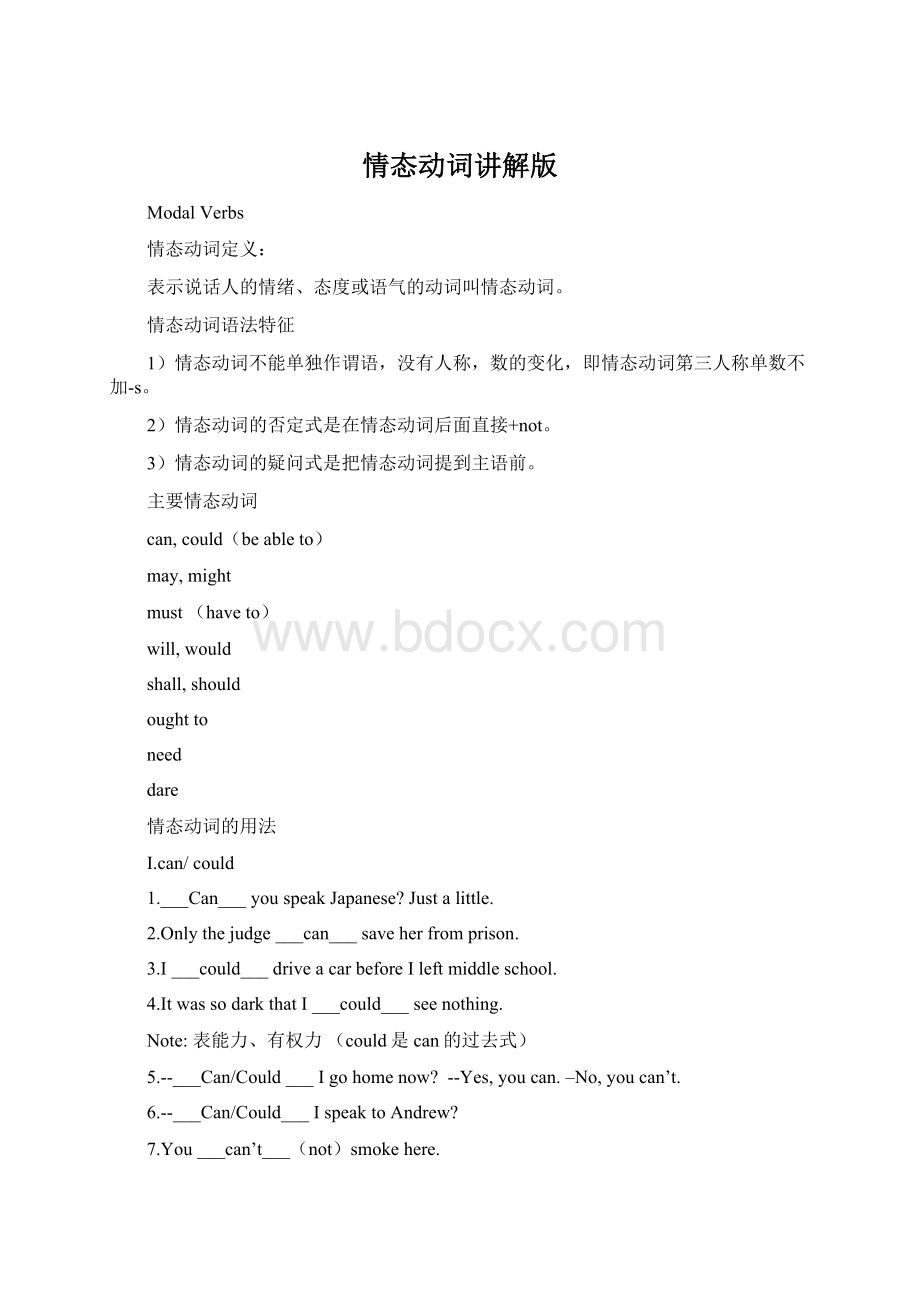情态动词讲解版.docx
《情态动词讲解版.docx》由会员分享,可在线阅读,更多相关《情态动词讲解版.docx(14页珍藏版)》请在冰豆网上搜索。

情态动词讲解版
ModalVerbs
情态动词定义:
表示说话人的情绪、态度或语气的动词叫情态动词。
情态动词语法特征
1)情态动词不能单独作谓语,没有人称,数的变化,即情态动词第三人称单数不加-s。
2)情态动词的否定式是在情态动词后面直接+not。
3)情态动词的疑问式是把情态动词提到主语前。
主要情态动词
can,could(beableto)
may,might
must(haveto)
will,would
shall,should
oughtto
need
dare
情态动词的用法
I.can/could
1.___Can___youspeakJapanese?
Justalittle.
2.Onlythejudge___can___saveherfromprison.
3.I___could___driveacarbeforeIleftmiddleschool.
4.ItwassodarkthatI___could___seenothing.
Note:
表能力、有权力(could是can的过去式)
5.--___Can/Could___Igohomenow?
--Yes,youcan.–No,youcan’t.
6.--___Can/Could___IspeaktoAndrew?
7.You___can’t___(not)smokehere.
Note:
(口语)允许、请求,表可以(could非can的过去式,表委婉)
8.It___can___/could____beverycoldhere,eveninspring.
9.Sheisclever,butshe___can___/could___bedullsometimes.
Note:
(表示偶然现象发生的可能性)有时会,时而可能
10.It___can’t___/couldn’t___(not)bemyfather.Heisabroadnow.
11.Thereissomeoneoutside.Who___can___itbe?
12.You__can’t/couldn’thaveseenhim__(notsee)him.Hewasnotthere.
13.She__can’t/couldn’thavebeen___(notbe)morethansixthen.
14.He__can’t/couldn’thavefinished___(notfinish)theworklastnightwithoutyourhelp.
Note:
表推测(否定、疑问句)
15.He__couldhavetold__(tell)metheanswerbutherefusedto.
Note:
过去本能做而没有做
16.You_cannot/cannever_________dotheworktoowell.
17.You_cannot/cannever__becarefulenoughinyourstudy.
Note:
cannot…too;cannever...too;cannotenough再…都不为过;越…越好
can&beableto
区别:
1.can只有两种时态现在时can&过去时could
beableto有各种时态
2.用于一般所具有的能力,可以互换,但是当表示成功做到时,通常用beableto或manageto
1.He_can/isableto_writemusic.
2.Weshall__beableto__finishtheworksoon.
3.Ihaven’t_beenableto_findthebook.
4.He_could/wasableto__swimlikeafishwhenhewasyoung.
5.ItalkedwithherforalongtimeandfinallyI__wasableto_makeherbelieveme.
6.Thefirespreadthroughthebuildingquicklybuteverybody___wasableto/managed___toescape.
II.may/might
1.--__May___Ileavenow?
--Yes,you__may__./Yes,please.
--No,you__maynot/can’t/mustn’t___.
2.Heaskedifhe_might_____usethephone.
3.Westartearlysothatwe_may/might___arriveintime.
Note:
(允许、请求)可以
4.__May__youbehappyallyourlife.
Note:
祝、愿
5.Johnisabsent.He__may/might_____beill.
6.It_may/might______raintomorroworit__may/might_____bemerelycloudy.
7.Ican’tfindmybook.I_may/mighthaveleft___(leave)itinyourofficejustnow.
8.Youknowthisstoryverywell.You_may/mighthaveread___(read)itbefore.
Note:
表推测
9.Westartearlysothatwe___may___arriveintime.
10.IwrotedownhistelephonenumbersothatI___might___rememberit.
Note:
表目的(用于目的状语从句中)
maybe&maybe
11.He___maybe___here.I’mnotsure.
12.____Maybe______youshouldcallhim.
13.–Areyougoingouttonight?
--____Maybe____.
III.must
1.You__must___haveapassportifyouwanttogoabroad.
2.Drivers__mustn’t___driveafterdrinking.
Note:
(义务、责任、强制、命令)必须应该
3.You_must_______firstfinishyourhomeworkbeforeyouwatchTV.
4.--_Must________Icometomorrow?
--Yes,you__must____.
--No,you__needn’t/don’thaveto_____.
Note:
(说话者主观上的意愿、建议、命令等)应该、必须、务必
5.Winter__must___befollowedbyspring.
6.Alllivingthings___must___die.
Note:
表示客观规律不可避免性或必然性,注定要,必然(只用于肯定句)
7.You__must___beill.Icanseeitfromyourface.
8.You__musthaveread___(read)thebook.Youknowthestoryverywell.
9.There’smuchnoisefromnextdoor.They__mustbehaving__(have)aparty.
Note:
表肯定推测
Must&haveto
区别:
1.haveto用于各种时态,还可和其它情态动词连用
2.haveto表示因客观环境的迫使而不得不做某事
1.--Let’sseeamovietonight.
--I’dloveto,butI__haveto____takecareofmymom.
2.They__hadto__speedup,fortheweatherturnedterrible.
3.Theywill___haveto___getupearlytomorrow.
4.Wemay___haveto___putofftheplan.
5.You___don’thaveto___tellhimaboutit.不一定要
6.You___mustn’t___tellhimaboutit.一定不要
IV.shall
1.I__shall________ringyouassoonasIarrive.
Note:
将来时(第一人称)将要、会
2.__Shall______Iopenthewindowforyou?
3.Let’sgotothecinematonight,__shall___we?
Note:
(在问句中表示说话人征求对方意见或提出建议,用于第一、三人称)…好么
V.should&oughtto
1.Wehopedthatwe__should______beabletodothat.
Note:
用于过去将来时
2.You_should/oughtto____bemorecarefulnexttime.
3._Should____Icallhimandapologize?
Note:
(表示建议、劝告、命令、要求)应该,必须(oughtto语气强)
4.It’s4:
30.They__should______beinNewYorkbynow.
Note:
(表示说话者根据一定的依据猜测、推测、推论等)该,可能
5.You_shouldhavetold__(tell)meearlieraboutit,butyoudidn’t.
6.You__shouldn’thavedone_________(do)thattoyourmother,butyoudid.
Note:
过去按理该…而实际没有…(常有责备、埋怨、惋惜之意)
VI.will
1.He_will____comebacksoon.
Note:
将来时
2.Ihopeyou__will____succeed.
3.I__will____domybesttohelpyou.
Note:
(表意愿、决心、承诺)要、愿、想、会、保证
4.Whenheisintrouble,he__will______turntohiscoachforhelp.
5.I_will___turnyououtofdoorsifyoudon’tkeepquiet.
Note:
状语从句
VII.would
1.Hetoldusthathe__would______meetusattheairport.
Note:
过去将来时
2.--__Would______youmindmysmoking?
--Yes,_pleasedon’t./You’dbetternot._______________.
---No,__goahead______________
Note:
提出请求、邀请(委婉)
3.I__would________liketoseeafilmtonight.
4.I_would____rathernotleaveyouhere.
5._Would__youplease_notsmoke____(notsmoke)here?
Note:
意愿、决心、喜欢等
6.He_would_________bedelightedifIwenttoseehim.
7.Ifyouhadcomeearlier,you_wouldhaveseen__(see)him.
Note:
条件句(虚拟)
8.Whenhewasyoung,he__would__often__walk___(walk)inthesewoods.
Note:
(表过去习惯性、经常性的行为或动作)总是
VIII.need(情态动词没有过去式)
Note:
1)need作实意动词,有人称、时态和数的变化
2)need作情态动词,只能用在否定句和疑问句中,没有人称、时态和数的变化
needsthdon’tneedsthDo…needsth?
needtododon’tneedtodoDo…needtodo…?
needn’tdoNeed…do…?
1.He__needsto_________(go)therenow.
2.He_neednot/doesn’tneedtogo__(notgo)therenow.
3.--__Need_/Does______he____go_/needtogo___(go)therenow?
--Yes,he_must__/does______.
--No,he_needn’t_/doesn’t________.
4.HeneedstofinishtheworkbyFriday,___doesn’t______he?
5.Heneedn’tstaythere,__need_______he?
6.He__needn’thavegiven_____(notgive)hersomuchmoneyatthetime,andnowheregretsit.
Note:
needn’thavedone过去本不必做却做了
needdoing&needtobedone
7.I_needto__(repair)thecomputer.
Thecomputer__needsrepairing_____.(repair)
Thecomputer__needstoberepaired____(repair)
IX.dare(情态动词有过去式dared)
Note:
1)dare作实意动词,有人称、时态和数的变化
2)dare作情态动词,只能用在否定句和疑问句中,没有人称和数的变化,但有过去时。
daretododon’tdaretodoDo…daretodo…?
darenotdoDare…do…?
1.He__darestosay__(say)whathethinks.
2.He__darenotsay_/doesn’tdaretosay______(notsay)whathethinks.
3.--__Dare_/Does_____he__say_/daretosay____(say)whathethinks?
--Yes,he__dare/does_________.
--No,he__darenot/doesn’t______.
4.How__dare_____yousay(say)so?
5.I__dare__you___toclimb_____(climb)thetree.
Note:
daresb.todosth.谅某人也不敢做某事
6.I__daresay________(say)thingswillimprove.
Note:
Idaresay我敢说,我认为,很可能,恐怕
补充:
1.情态动词表猜测时,不同的“肯定”程度依次排列如下:
●Heisathome.(事实)
●Hemustbeathome.(非常可能)
●Heshouldbeathome.(很可能)
●Hemaybeathome.(仅仅可能)
●Hemightbeathome.(或许)
●Heisn’tathome.(事实)
●Hecan’tbehome.(接近肯定)
●Hecouldn’tbeathome.(不及can’t肯定)
●Hemaynotbeathome.(可能,但不肯定)
●Hemightnotbeathome.(不及may肯定)。
2.情态动词+havedone
couldhavedone(本能做而没做…)
can’t/couldn’thavedone(不可能已经做了…)
musthavedone(肯定已经…)
may/mighthavedone(可能已经做了…)
mightnothavedone(不太可能已经…)
shouldhavedone(本应该而没做…)
shouldn’thavedone(本不应当做而做了…)
needn’thavedone(本没必要而做了…)
1.WhydidyoustayatahotelwhenyouwereinNewYork?
You____couldhavestayed_____withBarbarathere.
2.ThephonerangbutIdidn’thear.I____musthavebeenasleep_____atthattime.
3.–Doyouthinkshesawyou?
--No,shewastoofaraway.She__couldn’thaveseen___me.
4.–Iwonderwhyshedidn’tsayhello.Perhapsshedidn’tseeme.
--That’spossible.She___mightnothaveseen___you.
5.–DoyouknowwhereGeorgeis?
Ican’tfindhimanywhere.
--I’mnotsure.He____mighthavegoneshopping___.
6.IfIhadn’tslippedonthestairs,I___wouldn’thavebroken____myarm.
7.Whydidyouwashthatshirt?
Itwasn’tdirty.You___needn’thavewashed___it.
8.Itwasagreatpartylastnight.You___shouldhavecome___.Whydidn’tyou?
9.I’mfeelingsick,forIhaveeatenalotofchocolate.I_____shouldn’thaveeaten____toomuchchocolate.
北师大版八年级数学上
勾股定理练习题
一、基础达标:
1.下列说法正确的是( )
A.若a、b、c是△ABC的三边,则a2+b2=c2;
B.若a、b、c是Rt△ABC的三边,则a2+b2=c2;
C.若a、b、c是Rt△ABC的三边,
,则a2+b2=c2;
D.若a、b、c是Rt△ABC的三边,
,则a2+b2=c2.
2.Rt△ABC的三条边长分别是
、
、
,则下列各式成立的是( )
A.
B.
C.
D.
3.如果Rt△的两直角边长分别为k2-1,2k(k>1),那么它的斜边长是( )
A、2kB、k+1C、k2-1D、k2+1
4.已知a,b,c为△ABC三边,且满足(a2-b2)(a2+b2-c2)=0,则它的形状为( )
A.直角三角形B.等腰三角形
C.等腰直角三角形D.等腰三角形或直角三角形
5.直角三角形中一直角边的长为9,另两边为连续自然数,则直角三角形的周长为( )
A.121B.120C.90D.不能确定
6.△ABC中,AB=15,AC=13,高AD=12,则△ABC的周长为( )
A.42B.32C.42或32D.37或33
7.※直角三角形的面积为
,斜边上的中线长为
,则这个三角形周长为()
(A)
(B)
(C)
(D)
8、在平面直角坐标系中,已知点P的坐标是(3,4),则OP的长为()A:
3B:
4C:
5D:
9.若△ABC中,AB=25cm,AC=26cm高AD=24,则BC的长为()
A.17B.3C.17或3D.以上都不对
10.已知a、b、c是三角形的三边长,如果满足
则三角形的形状是()
A:
底与边不相等的等腰三角形B:
等边三角形
C:
钝角三角形D:
直角三角形
11.斜边的边长为
,一条直角边长为
的直角三角形的面积是.
12.等腰三角形的腰长为13,底边长为10,则顶角的平分线为__.
13.一个直角三角形的三边长的平方和为200,则斜边长为
14.一个三角形三边之比是
,则按角分类它是三角形.
15.一个三角形的三边之比为5∶12∶13,它的周长为60,则它的面积是___.
16.在Rt△ABC中,斜边AB=4,则AB2+BC2+AC2=_____.
17.若三角形的三个内角的比是
,最短边长为
,最长边长为
,则这个三角形三个角度数分别是,另外一边的平方是.
18.如图,已知
中,
,
,
,以直角边
为直径作半圆,则这个半圆的面积是.
19.一长方形的一边长为
,面积为
,那么它的一条对角线长是.
二、综合发展:
1.如图,一个高
、宽
的大门,需要在对角线的顶点间加固一个木条,求木条的长.
2、有一个直角三角形